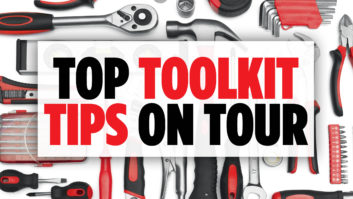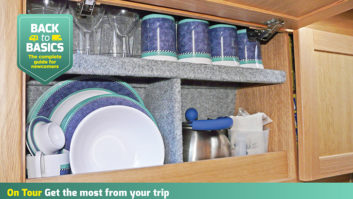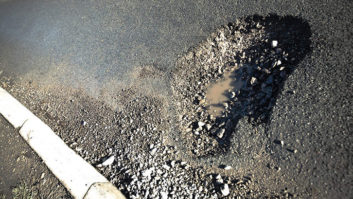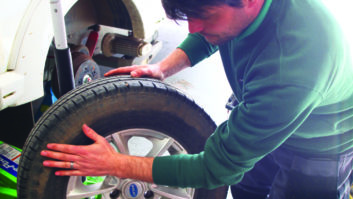Instead of being stranded at the roadside or on site, be more self-sufficient – build a simple toolkit. Here are a few items to cover most eventualities.
Tools
Spanners A full set weighs too much: just take one for changing gas bottles, another for removing the battery (usually 12 or 13mm), and an adjustable spanner for anything else.
Screwdrivers Just take a few important ones: a large flat-bladed screwdriver (also useful as a pry-bar) and a Phillips, plus a smaller flat-bladed screwdriver, will usually suffice. A small electrical screwdriver is useful, too.
Torque wrench Forget your wheel brace – just use a torque wrench with the correct socket for securing your wheel nuts. It will ensure that you never overtighten them.
Utility knife There is no end to the uses of a good knife. They are dirt cheap to buy, too.
Long-nose pliers (needle) and bull-nose pliers will cater for most needs. They are good for stripping or cutting wires, gripping screws with chewed heads, and more.
Tapes and ties
PTFE tape Ideal for plumbing or engine leaks. Wrap it around the thread, tighten the joint and your leak may well be cured. Costs and weighs little.
Insulating tape Another ‘must-have’ item. If the insulation on a wire gets damaged, this will patch it up.
Cable ties Great for get-you-home repairs. They cost pennies but secure wobbly wheel trims and keep wires tidy. Virtually indestructible, too.
Rope or strong string A length of rope can add extra security to your bike rack, tether luggage, or secure damaged items on your vehicle.
Essential extras
A length of wire This can bridge the gap on damaged cables. Carry a variety of gauges but always err on the ‘thick’ side. Wire that is too thick won’t cause much grief, but if it is too thin it could overheat and start a fire.
WD40 Ideal for stopping squeaks, loosening seized fixings and curing iffy electrical connections.
Electrical terminals and crimping pliers Having a means of joining wires or broken terminals is very important, so carry a selection of terminals.
Some rags Keep some old rags inside your vehicle’s cab for wiping the windows or dashboard, and others for dirty underbonnet work (e.g. wiping the dipstick).
Foot pump and tyre pressure gauge A good-quality tyre pressure gauge means you don’t have to trust unreliable garage air lines. And a footpump allows you to top up your tyres wherever you are.
Other useful items
Torch Vital for night-time repairs.
Duck tape Tough, cheap and holds almost anything together.
Multimeter Cut the time spent diagnosing that electrical problem.
Gas soldering iron Useful for 12V electrical repairs.
TOP TIP
Nuts or fixings keep coming undone? Keep a tube of Loctite’s Threadlocker handy – it will stop them working loose. Failing that, cyanoacrylate (Super Glue) will do nicely.
TOP TIP
Rescue Tape (www.rescuetape.com) is useful for electrical fixes. It’s airtight, watertight, and withstands up to 260°C and up to 8000V.
For more information
Electrical suppliers
Auto Electrical Supplies Web www.autoelectricsupplies.co.uk. Tel 01584 819 552
The 12 Volt Shop Web www.the12voltshop.co.uk. Tel 01726 73296
Vehicle Wiring Products Web www.vehicle-wiring-products.eu. Tel 0115 930 5454
Tool manufacturers and retailers
Draper Web www.draper.co.uk. Tel 023 8026 6355
Machine Mart Web www.machinemart.co.uk. Tel 0870 770 7800
Screwfix Web www.screwfix.com. Tel 0500 41 41 41
Stanley Web www.stanleyworks.co.uk. Tel 0114 244 8883
Tooled up Web www.tooled-up.com. Tel 0870 240 8141







